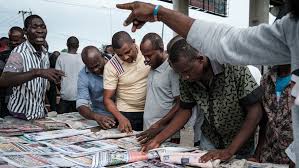APA – Lagos (Nigeria)
The report that the naira fell to a new all-time-low of N1,534/$ on the official Nigerian Autonomous Foreign Exchange Market on Monday is one of the trending stories in Nigerian newspapers on Tuesday.
The Punch reports that the naira fell to a new all-time-low of N1,534/$ on the official Nigerian Autonomous Foreign Exchange Market on Monday.
This indicates a loss of 3.93 per cent fall or N58 from the N1,476.13/$ the national currency closed last week Friday, according to FMDQ Exchange, a platform that publishes official foreign exchange trading in the country.
Monday’s official rate became the worst official exchange rate since the Central Bank of Nigeria floated the national currency in June 2023.
However, at the parallel market on Monday, the naira traded between the rate of N1,480 and N1,490. It appears the local currency has been trading higher at the parallel market in recent times especially since the FMDQ reviewed the methodology it uses to calculate the official exchange rate.
The change in the methodology for the calculation of the official exchange rate had led to the depreciation of the naira from over 900/dollar to over 1,400/dollar.
Sometime in December, the naira closed above the N1000/$ on the official window.
The newspaper says that the International Monetary Fund has said Nigeria’s foreign reserves may fall to $24bn in 2024.
The fund revealed this in its latest country report for Nigeria, indicating a significant drop and potential forex challenges for Africa’s largest economy.
The country’s external reserves stood at $33.12bn as of February 8.
The IMF anticipated a challenging period through 2024–25 for the country’s financial account, exacerbated by an absence of new Eurobond issuances, significant repayments of existing funds and Eurobonds totalling $3.5 billion, and continued portfolio outflows.
Despite projecting a current account surplus, the reported reserves were expected to diminish to $24bn in 2024, with a hopeful recovery to $38bn by 2028 as portfolio inflows were forecasted to pick up once again.
The report read, “Through 2024–25, the financial account is likely to deteriorate, with no projected issuance of Eurobonds, large Fund and Eurobond repayments of $3.5bn, and portfolio outflows.
“Hence, despite a current account surplus, officially reported reserves are projected to decline to $24bn in 2024 before increasing again to $38 billion in 2028 as portfolio inflows resume.”
The IMF noted that the first half of 2023 witnessed a surplus in the current account, yet there was a notable decline in reserves.
The downturn has been attributed to a decrease in crude oil exports, largely due to oil theft and a lack of investment in essential upstream infrastructure.
The Vanguard reports that the Peoples Democratic Party Governors’ Forum (PDP-GF) has urged the Federal Government to strive hard to address the security challenge and economic hardship facing Nigerians.
The governors said this in a communiqué at the end of their meeting, which was read by Gov. Bala Mohammed, the chairman of the forum in Abuja, on Monday.
Mohammed said that the governors at the meeting reviewed the nation’s state and the hardships Nigerians face as a result of the economic and security challenges facing the nation.
“The forum consequently urges the Federal Government to, as a matter of urgency, embark on initiatives involving all the subnational governments to bring a lasting solution to the crises.
“The PDP governors will continue to play their part in the effort to bring security and succour to our people.
“To this end, we reiterate our call for state police with appropriate safeguards to avoid any abuse or overreach by any tier of government,” he said.
Mohammed said that the governors also reviewed recent developments in the PDP and committed to leading efforts to revamp the party to serve as an effective opposition in Nigeria.
The newspaper says that Governor Abdullahi Sule of Nasarawa State said foreigners operating in the Nigerian solid minerals sector are milking Nigeria dry at the expense of its citizens.
Sule stated this at a public policy dialogue on Nigeria’s minerals and mining legislation, organised by the House of Representatives Committee on Solid Minerals at the National Assembly Complex, Abuja, on Monday.
He called for institutional reforms to turn around the fortunes of the sector for the benefit of Nigerians.
He said, “One community in Nasarawa got some kind of compensation of a very small amount of N700m. They were so excited but this was nothing compared to the time when lithium was running roughly about $76,000 per metric ton.
“If we are serious about the future of the economic situation of Nigeria, we must reform what we call the solid mineral sector and if we must reform, we must come up with policies and reform them to benefit Nigerians. If we don’t do that, we will just be joking.”
The Chairman, House Committee on Solid Minerals, Jonathan Gaza said the Nigerian Minerals and Mining Act (Amendment) Bill being considered proposes five per cent of the total revenue of all minerals mined to the host communities.
He said the bill, when passed, will allow for the establishment of a Mines Inspection and Environmental Agency to provide improved deeper oversight of mining activities and bridge the gap between the Federal and State Governments to empower the Mineral Resources and Environmental Management Committee for effective and joint oversight.
“The establishment bill for a Solid Minerals Development Company allocates 75 per cent ownership to the private sector and 25 per cent to the federation of Nigeria. Community Development and the Environment are really prioritised in the bill. The Petroleum Industry Act sets aside 3 per cent of their annual operational expenditure to host communities.
“In the bill, we have set aside 5 per cent of the revenue of all minerals mined to the host communities, and this is due to informality of the sector. We believe that it can be reviewed and improved through this programme,” he said.


